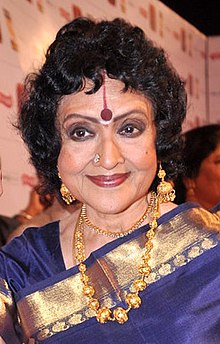
Back فيجايانثيمالا ARZ বৈজয়ন্তীমালা Assamese ویجینتی مالا AZB वैजयंती माला Bihari বৈজয়ন্তীমালা Bengali/Bangla Vyjayantimala German Vyjayanthimala Spanish ویجینتی مالا Persian Vyjayanthimala Finnish Vyjayanthimala French
Vyjayanthimala | |
|---|---|
 Vyjayanthimala at Stardust Awards 2013 | |
| Born | Vyjayanthimala Raman 13 August 1933 Triplicane, Madras, Madras Presidency, British India (present-day Thiruvallikeni, Chennai, Tamil Nadu, India) |
| Occupation(s) | Actress, Indian classical dancer, Carnatic singer, politician |
| Years active | 1949–1970 |
| Works | Full list |
| Spouse |
Chamanlal Bali
(m. 1968; died 1986) |
| Children | Suchindra Bali[1] |
| Mother | Vasundhara Devi |
| Awards | Full list |
| Honours |
|
| Member of Parliament Lok Sabha | |
| In office 1984–1991 | |
| Preceded by | Ramaswamy Venkataraman |
| Succeeded by | R. Sridharan |
| Constituency | Chennai South |
| Member of Parliament, Rajya Sabha | |
| In office 27 August 1993 – 26 August 1999 | |
| Personal details | |
| Political party | Bharatiya Janata Party (1999–present) |
| Other political affiliations | Indian National Congress (1984–1999) |
| Signature | |
Vyjayanthimala Bali (née Raman; born 13 August 1933), known mononymously as Vyjayanthimala, is an Indian parliamentarian, dancer and former actress. Regarded as one of Hindi cinema's finest actresses and dancers, she is the recipient of several accolades, including five Filmfare Awards and two BFJA Awards. Considered the first female superstar of Indian Cinema,[3] she made her screen debut at the age of 16 with the Tamil film Vaazhkai (1949), and followed this with a role in the Telugu film Jeevitham (1950). Her first work in Hindi cinema was the social guidance film Bahar (1951), which she headlined, and achieved her breakthrough with the romance Nagin (1954).
She garnered widespread critical acclaim for her role in the period drama Devdas (1955), where she played Chandramukhi, a tawaif with a heart of gold. The film and her acting was highly praised, later considered to be her magnum opus. For Devdas, she won the Filmfare Award for Best Supporting Actress which she refused, stating that she played a leading role equal to that of Suchitra Sen, her co-star, and so she could not accept the award for a supporting role. She went on to star in series of commercial successes, which include the romance New Delhi (1956), the social drama Naya Daur (1957) and the comedy Aasha (1957). Her roles in the social drama Sadhna (1958) and the paranormal romance Madhumati (1958), each earned her a nomination for the Filmfare Awards for Best Actress, winning for the former.
In the 1960s, the crime drama Gunga Jumna (1961) saw Vyjayanthimala playing a rustic village belle, Dhanno, a role which won her the Filmfare Award for Best Actress. She won the award again for the musical romantic drama Sangam (1964). She went on reinvent her image, earning a mixed reception after notably appearing in a one-piece swimsuit in a film role. She later achieved acclaim for her performance in the historical drama Amrapali (1966) which was based on the life of Nagarvadhu, royal courtesan of Vaishali, Amrapali. Her notable successes following were the swashbuckler film Suraj (1966), the heist film Jewel Thief (1967), the bengali art film Hatey Bazarey (1967), the action drama film Sunghursh (1968) and the epic film Prince (1969).
In 1968, she was awarded the Padma Shri by the Government of India, the fourth-highest civilian honor. After a starring role in the film Ganwaar (1970), Vyjayanthimala retired from the acting industry. She has since gained popularity for her dancing, particularly for her work in Bharata Natyam, a form of Indian classical dance, and was later given the Sangeet Natak Akademi Award, the highest Indian recognition given to practising artists. In 2024, she was awarded the Padma Vibhushan, the second-highest civilian honor granted by the Government of India.
- ^ "An ageless icon". Deccan Herald. 4 November 2017. Retrieved 1 August 2018.
- ^ "Many told me that I had gotten the award too late, but I believe I'm just getting started: Bala Kondala Rao". The Times of India. Retrieved 1 August 2018.
- ^ "#ETimesTrendsetters: Vyjayanthimala, the 'first female superstar' of Indian cinema whose grace paved new era in fashion and beauty | Photogallery - ETimes". photogallery.indiatimes.com. Retrieved 18 October 2024.